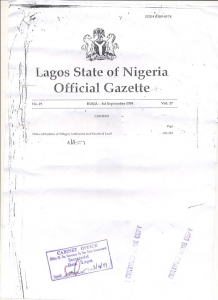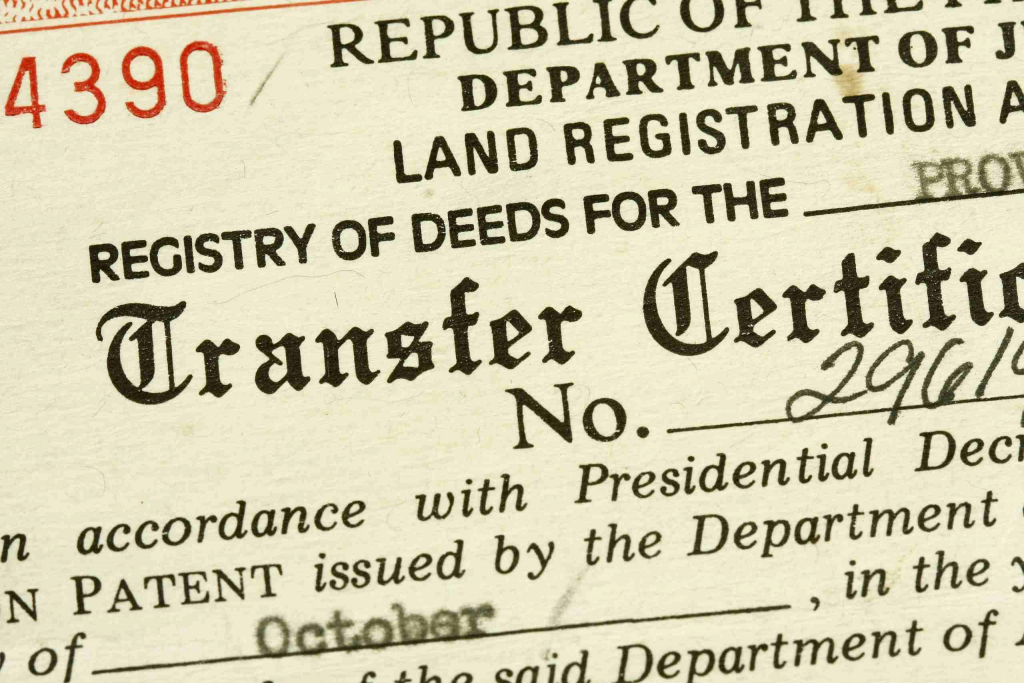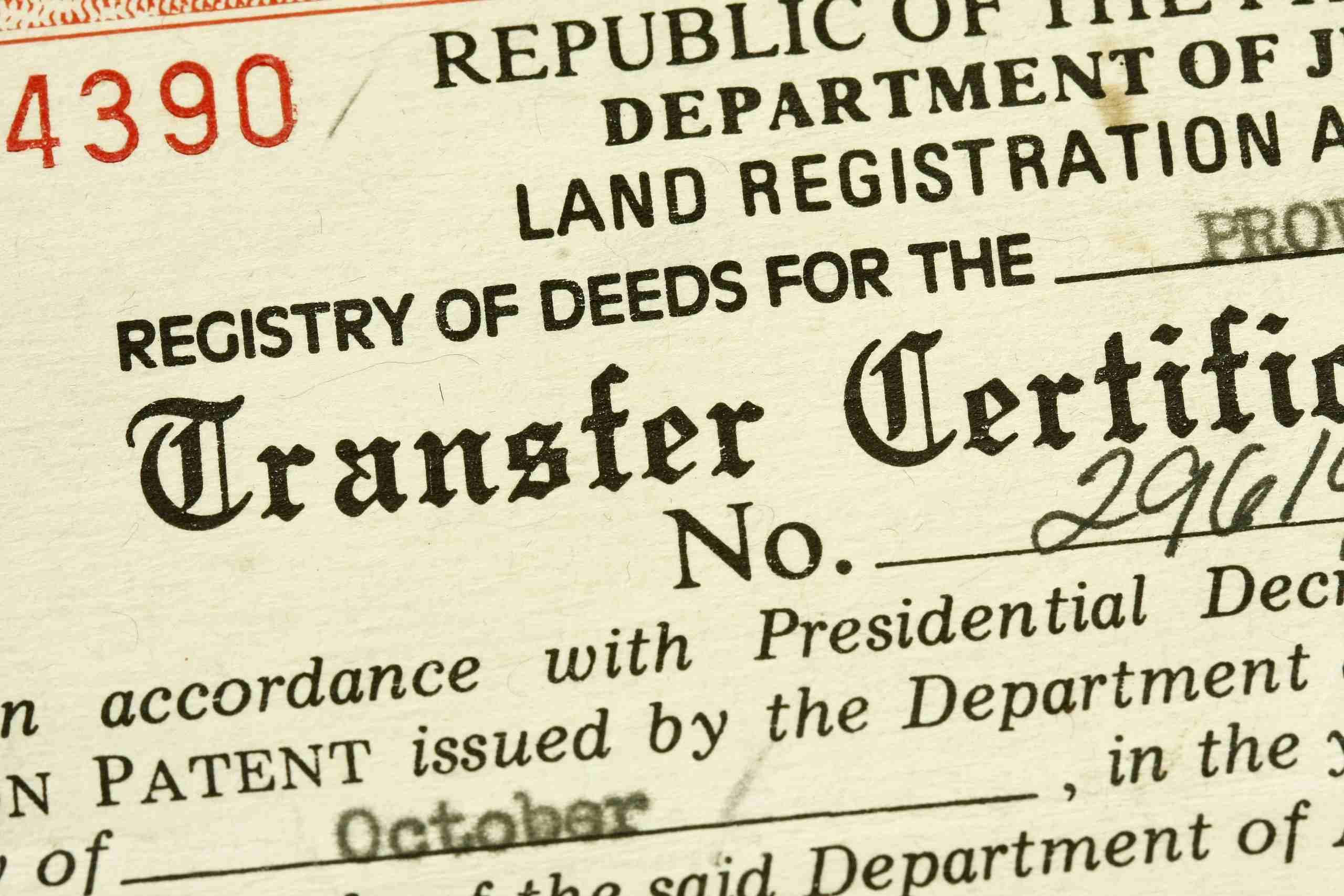TABLE OF CONTENT
- Introduction
- Definition of Land Titles
- Definition of Land Documents
- Types of Land Titles
- Types of Land Titles

Introduction
When buying land, it is important to understand property rights. Owning a piece of land simply is not enough. Your knowledge of laws, policies, and obligations goes a long way to avoid land controversies. These land-linked issues include; false ownership, inheritance issues, fraud, and demolition of land by government authorities, among others, which make prospective land owners weary of making a wrong decision.
According to the Land Use Act of 1978, every land is owned by the state government. After 99 years of the government leasing the land, the title can be renewed by the owner. Based on this Act, the land is either free or under government acquisition. The Land Use Act of 1978 introduced the uniform Land Administration system that abolished the original land tenure systems being used before. This new act was created to make land readily available to Nigerians, improve tenure security, prevent speculative purchases of communal land, and simplify management and ownership of land.
Fundamentally, the land is owned by the state government and can be passed to individuals, corporations, or bodies through a structured leasing process. To facilitate this, land titles and documents are core requirements for the seamless transfer between entities.
Definition of Land Titles
In Nigeria, there are several land titles and documents that you would need before acquiring land or properties. Land titles are corporate documents that define the right of ownership of a piece of land or property. Conversely, land documents are documents acquired after a land purchase such as a receipt, invoice, contract of sale, survey, deed of assignment, and allocation.
Definition of Land Documents
Land titles show the boundaries and rights that landowners possess and can aid prospective buyers with visualizing the ownership cycle. Before buying land in Nigeria, you should find out the title of the land and ask to see evidence of the title document. Similarly, investors should find out the documents they will need to get, and the conditions of getting those documents when purchasing land or property.
In this article, you will discover all you need to know about the titles and documents needed when buying a property or land in Nigeria. These are land titles and documents in Nigeria explained.
Types of Land Titles in Nigeria
Property titles are legitimate documents that serve as evidence for ownership of land. These titles should be vetted before investing in a property as they provide security, value, and confirmational proof to real estate investors. The following titles should be acquired by prospective purchasers and land owners.
Certificate of Occupancy (C of O)
A Certificate of Occupancy (C of O) is a state government-issued document used to prove ownership of land. Without a C of O, your land or property can be seized at any point in time without compensation. A Certificate of Occupancy would be needed when beginning property development, converting the use of the property, and changing the ownership of a property. This document has different sections such as file no., plot size, location, date of issue, lease term, the terms and conditions, land use purpose, and many more.

A Certificate of Occupancy is usually granted for a maximum period of 99 years, after which it may be renewed after application. It indicates the specific owner of a property, increases the land value, can be accepted as collateral when taking loans, and prevents government repossession or false claim of property by other parties.
A Certificate of Occupancy is presented to land owners who held a piece of land before 1979. C of O’s are only issued to the first person to purchase the land and can not be issued again. It is presented for all government properties and land allocations.
Right of Occupancy
Right of Occupancy (R of O) is the right of an individual or community to occupy or use land lawfully according to the Land Use Act provisions. The R of O title grants a person, community, or corporate organization rights over parcels of land in government consented layouts. This doesn’t proclaim ownership rights. A customary Right of Occupancy can be accorded by the local government primarily in pastoral areas and is the right of an individual or community to legally use land or occupy land under the customary laws. This is granted for agricultural, residential, and other uses. The state of government is entrusted with the authority to bestow the right of occupancy for any purpose regardless of whether it is a rural or urban area.
Differences Between Certificate of Occupancy and Right of Occupancy
- Unlike a Certificate of Occupancy, a Right of Occupancy only presents an offer to the property, not the official ownership rights of that land.
- The R of O can have the rights revoked without indemnity whereas in such cases, compensation is granted to owners of a C of O.
- A Certificate of Occupancy title can be used as a collateral document while a Right of Occupancy is not an ideal title used for loans. It has been subject to abuse because of the favoritism in land allocation and is hence not desirable.
- R of O is a weaker title and hence cheaper and vulnerable in disputes while C of O is a superior title and goes through a strenuous process hence why it is expensive and desirable, especially in Abuja and Lagos, Nigeria.
- A customary R of O is commonly granted by a Local Government Authority (such as Abuja, a municipal) which is different from a C of O issued only by the state government and signed by the Governor.
Governor’s Consent
The consent of the Governor is required when land with a Certificate of Occupancy is resold before it is deemed legal. As the name implies, the governor consents to the transfer of ownership of lands and properties when a Certificate of Occupancy was once issued.
There can only be one owner of the Certificate of Occupancy. Hence, all subsequent buyers of that property or land are obligated to acquire a governor’s consent. To legalize the transaction and gain rights to that property or land, this consent must be approved by the governor of that state. The reason behind this is to inform the government of the new possession of the land. The Governor’s Consent can be applied for as many times as a parcel of land is resold.
Excision and Gazette
Excision is the process of the government releasing an allotment of land back to the aboriginal owners for commercial and residential developments and activities. A family or individual interested in that land can process an excision approved by the government, and documentation for the land can be processed to the governor’s consent level. When the excised land is declared in the government official gazette such land is said to have Gazette as the title. The Gazette then becomes the title of the land.

Gazette is a legal record book that explicitly details the characteristics of a parcel of land that has been excised and recovered by the family or community. The name of the community and details of the land used in the excision process will be included in this document. A person or community can apply for a Certificate of Occupancy or Governor’s Consent with a gazette. Excision and gazette are good titles connected to land ownership and transfer and it ensures that land is safe to buy and develop.
Differences between Excision and Gazette
- Excision features the community granted land for commercial or residential purposes while a Gazette details all necessary information including the special government details such as the village or family accorded the rights, the acres of land, and the purpose of the land amongst others.
- Without a Gazette, an excised land can be seized or revoked from the owners. Hence, a Gazette is superior and must be gotten for security purposes.
- An Excised title shows the land left for a community by the government while a Gazette publishes legal notices to comply with lawful requirements for public information and will detail the acquisition process between the government and the community including land still owned by the government.
Government Allocation
Government Allocation documents are for properties within government acquisition, which the government allocates to a person or organization. These government-acquired land either have clear plans or are yet to be assigned by the government.
Real estate companies, multinational corporations, hospitals, government parastatals, etc usually approach the government to partake in this opportunity, and when the government approves their request to use this land for a defined goal or plan, the government allocates. This document is solely for this purpose.
Registered Survey Plan
An approved Survey Plan details the size and location of the landed property. The plan shows the precise measurement and description of the landed property. All lands must be surveyed by a certified Surveyor who is regulated by the Surveyor-General of the state and the plan will be submitted for approval. Without this, it is unclear if the land is committed (i.e., land earmarked for a specific activity or project by the federal or state government). A Survey Plan must contain the drawn beacon numbers, the Surveyor in charge of the plan, a stamp showing the land is either under government acquisition or not, and the owner’s name, address, description, and size of the land being surveyed.
The survey document makes it easier to search if the land is under any government acquisition at the office of the Surveyor-General. Before purchase, a registered survey plan can be used to chart land. This charting will determine the approved use of the land, the status of the land, projected and long-term plans of government in that area, the right procedure for that property, and excision and gazette details of the land.

Freehold
A Freehold land title highlights the perpetuity by which a land owner owns the land (free from hold). The term ‘Freehold’ is used to describe land that is ‘free’ from government acquisition or encumbrances. This means that freehold land ownership has no limit. This type of land is popular in Epe, Lagos State. Free lands are the kind of lands that the government has no interest in, unlike acquired land that is desirable to the government. It is advisable for buyers of freehold land to process a registered survey and subsequently a proper title like C of O after purchase.
Freehold is more of a land status than a title. It is generally bought through an auction or lottery. It is easy to sell and can be used to gain bank loans. Capital appreciation is often more in this property type. However, it is more expensive than leasehold land and down payments are used most times to block the unit.
Letter of Administration
A Letter of Administration is used when the owner of a property dies without a valid will. This document is issued to the suitable next-of-kin(s) by the Court. The suitable party called the ‘administrator of the estate’ can be the spouse, child(ren), parents, siblings, grandparents, half-blood siblings, or uncles or aunts of the deceased.
With interest, the law can not grant transfer of ownership to any party. However, as expected there is a ranking for entitlement. In the case that there is equal ranking, the Court has the power to accept one or more of the parties as owners.
Grant of Probate
In situations where the owner of a landed property dies, the next of kin or representative of the deceased person must obtain a Grant of Probate before exercising ownership or control. This is only when the deceased left a Will or a Grant of Letter of Administration. The executors appointed by the Will must be willing, capable, and available to act and obtain the assets listed. These executors are then identified as the legal owners of property by law.
In the case that the executors are unwilling, incapable, or unavailable (infants, deceased, out of jurisdiction, unstable, or renounce probate), the Court can transfer ownership to interested and suitable parties with a grant of Letter of Administration to control the estate of the testator. The Letter of Administration and Probate are significant legal titles for properties left behind by a deceased individual. Both documents can be gotten from the High Court of the Federal Capital Territory or the Probate Registry of the State High Court.
Assent
A Deed of Assent is a document used to vest a legal interest or title in a defined estate into the beneficiaries of an estate or any third party by the executors or the legal administrators of the estate. It is invariably accompanied by a copy of a grant of probate or a letter of administration.
It grants the beneficiary legitimate ownership over a gift given by a Will. The Assent confers lawful ownership of a gift in a Will (and not the Will itself) on a beneficiary of an estate or any third-party buyer by the executors or the legal administrators of the estate. Where a Deed of Assent has been executed to favor the beneficiary(ies), a third party can not lay claims to that same property conferred on the beneficiary(ies).
Deed of Mortgage
A Deed of Mortgage shows that real estate has been transferred from the borrower to the lender. In this case, the borrower is known as the mortgagor while the lender is the mortgagee. This mortgage transaction is a temporary transfer granting the mortgagor the entitlement to retrieve his property from the lender when the entire loan amount and accrued interest have been paid.
Deed of Gift
A Deed of Gift is a land title that proves that land or property has been gifted from the donor to the donee. Similar to the Deed of Mortgage, the donor is the individual transferring ownership of land while the donee takes possession of the land as granted by the original owner. This transfer can be a permanent agreement and is supported by the government.
During this transfer, no Stamp Duty is necessary as no payment was made by the Donor for the property. However, Registration fees, Consent Fees, and Capital Gains Tax would be paid. A Governor’s Consent should be obtained in the state where the landed property is located.
Judgment of Court (Court’s Judgment)
Court judgment may affect or transfer an interest in a particular property from one party to another. The decision of the court is essential in cases associated with litigations or lawsuits and should be respected and taken into account.
This implies that cases brought before the court’s judgment, either with individuals, corporations, or the government, should be followed according to the court proceedings. The winning party can then process the necessary land or property documentation for reserved rights. This documentation can include either a Governor’s Consent, C of O, Excision, or Gazette.
Types of Land Documents
Land documents are the commitment documents and surveys, clients receive after the purchase of land. These documents surface at different times during the transaction process.
Land Purchase Receipt
A Purchase Receipt in a real estate transaction is a document or receipt acknowledging the payment for land or property. This receipt has to distinctly show the name(s) and signature of the purchase. Typically, vendors confer a Purchase Receipt to the buyer upon the sale of a property. However, the receipt may be ruled out where the clause for receipt is contained in the document transferring the land.
A Land Purchase Receipt must also show the amount paid and the full name of the buyer and seller boldly. It is usually required when registering the land.
Deed of Assignment
This document explains that a section of the property is covered by the C of O and a specific portion of the plan has been assigned to the purchaser. This deed must be signed and stamped accordingly with all details made clear. The Deed of Assignment document is drawn up by a real estate attorney liaising between the new buyer and the current title holder of that property. The assignor (seller of the landed property) uses this deed to prove the permanent transfer of property to the assignee (the buyer). Either party can draft and review this document. A Deed of Assignment with the Governor’s Consent is released to an individual who takes over land through sale rather than a new Certificate of Occupancy.
A Deed of Assignment or Deed of Conveyance is different from a receipt and the two documents should not be confused for the same document. A receipt proves that money was paid while a deed of assignment certifies ownership of a piece of property. However, every real estate transaction should have a receipt that has the right amount paid and the right person to whom the amount was paid.
This deed contains the date of the transaction and the specific details of the property included in the transfer of ownership. For legal evidence, it is pertinent for a Deed of Assignment to be recorded at the right Land Registry in charge of that state. This ensures that the transaction is public and made known to the government as well. At the Land Registry, the document will be approved and authenticated through a Registered Conveyance or Governor’s Consent after it has been stamped at the Stamp Duty office in that state.
Contract of sale
A Contract of Sale is a legal document that gives the full properties of what is being purchased and accounts of payments to be made at intervals. The Contract of Sale of land is used by parties to agree on some terms before the finalization of the transaction. It is relevant when a property is to be purchased by anyone. It is not a registrable instrument and must be preceded by other documents transferring title to the applicable property.

Survey Plan
A Survey Plan measures the boundary of a piece of land. The land is mapped out accordingly to show the type of title such land has. That is, if it is excised, gazetted, C of O, etc. it also shows if the land is still under government acquisition. This plan does not need to be registered. This type of Survey Plan is used when a customer buys land or property from a developer who has a survey for the entire estate or acres of land with a preceding Approved Survey Plan. This is required for the land to be resold or used for other purposes.
Allocation Letter
Allocation is the process of being granted a specific parcel of land. This document shows the detailed information linked to the property bought. Without allocation, the process of buying land is not complete. Until your land is marked out and demarcated, you can not use or sell the land. Allocation is done after payments and statutory fees are paid. This is done in batches at intervals in a year which varies by real estate company.
Conclusion
Every potential or aspiring owner of landed property is to ensure they conduct due diligence on the title, accessibility, and usage of the land to be bought. Other than having the right land title and document, land may be impeded for various reasons such as criminal forfeiture of landed property or pledge on the property. Understanding the different types ad how it applies to you can hedge against the risk of bad investment experiences and fraud.
The process of acquiring these titles and documents can be complex, tedious, and meticulous. Hence why you should consider having a reliable real estate company conduct this process on your behalf. Bestate partners with an independent property law firm that verifies all properties that sold and only verified properties are posted on our website or Youtube.
Contact
You can call us at +2348090651344, send a WhatsApp message, or email us at info@bestateng.com if you need assistance or recommendations.
In the meantime, kindly click on any of the links in this article to review the properties and lands we have currently for sale or visit our website for more opportunities with Bestate.
Don’t wait for the opportunity to knock, build a door. No goodbyes but next time!!



